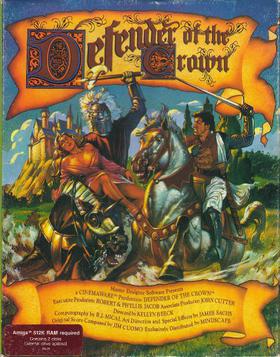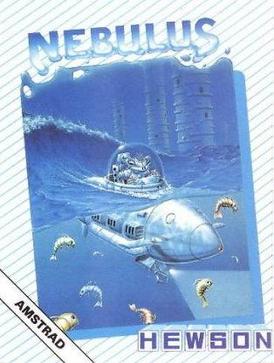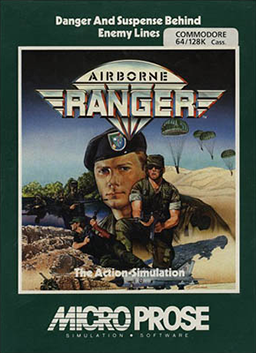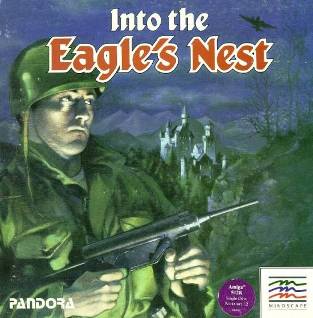
Silent Service is a submarine simulator video game designed by Sid Meier and published by MicroProse for various 8-bit home computers in 1985 and for 16-bit systems like the Amiga in 1987. A Nintendo Entertainment System version developed by Rare was published in 1989 by Konami in Europe and by Konami's Ultra Games subsidiary in North America. Silent Service II was released in 1990. Tommo purchased the rights to this game and published it online through its Retroism brand in 2015.

Defender of the Crown is a strategy video game designed by Kellyn Beeck. It was Cinemaware's first game, and was originally released for the Commodore Amiga in 1986, setting a new standard for graphic quality in home computer games.

Sid Meier's Pirates! is a video game created by Sid Meier for the Commodore 64 and published by MicroProse in May 1987. It was the first game to include the name "Sid Meier" in its title as an effort by MicroProse to attract fans of Meier's earlier games, most of which were combat vehicle simulation video games. The game is a simulation of the life of a pirate, a privateer, or a pirate hunter in the 16th, 17th and 18th centuries. It was widely ported to other systems.

Captain Blood is a French video game made by ERE Informatique and released by Infogrames in 1988. It was later re-released in the UK by Players Premier Software.

Roadwar 2000 is a 1986 video game published by Strategic Simulations, Inc. It is a turn-based strategy game set in a post-apocalyptic future which resembles the world portrayed in the Mad Max films.

Skyfox is a combat flight simulation game developed by Ray Tobey for the Apple II and published by Electronic Arts in 1984. Ariolasoft published the game in Europe. It was released for the ZX Spectrum, Amstrad CPC, Commodore 64, and Macintosh in 1985, to the Amiga and Atari ST in 1986, and to the PC-88 in 1988.

Nebulus is a platform game created by John M. Phillips and published by Hewson Consultants in the late 1980s for home computer systems. International releases and ports were known by various other names: Castelian, Kyorochan Land, Subline, and Tower Toppler.

Carrier Command is a 1988 video game published by Rainbird for the Amiga, Atari ST, IBM PC compatibles, ZX Spectrum, Macintosh, Commodore 64, and Amstrad CPC. Carrier Command is a cross between a vehicle simulation game and a real-time strategy game where players control a robotic aircraft carrier.

Ace of Aces is a combat flight simulation game developed by Artech Digital Entertainment and published in 1986 by Accolade in North America and U.S. Gold in Europe. It was released for the Amstrad CPC, Atari 8-bit computers, Atari 7800, Commodore 64, MSX, MS-DOS, Master System, and ZX Spectrum. Set in World War II, the player flies a RAF Mosquito long range fighter-bomber equipped with rockets, bombs and a cannon. Missions include destroying German fighter planes, bombers, V-1 flying bombs, U-boats, and trains. In 1988, Atari Corporation released a version on cartridge for Atari 8-bit computers styled for the then-new Atari XEGS.

Airborne Ranger is an action game developed and published by MicroProse for the Commodore 64 and ZX Spectrum in 1987 and the Amstrad CPC and IBM PC compatibles in 1988. Ports to the Amiga and Atari ST by Imagitec Design were released in 1989. A sole U.S. Army Ranger is sent to infiltrate the enemy territory to complete various objectives. The game was followed by Special Forces in 1991.

F-15 Strike Eagle is an F-15 Strike Eagle combat flight simulation game released for Atari 8-bit computers in 1984 by MicroProse then ported to other systems. It is the first in the F-15 Strike Eagle series followed by F-15 Strike Eagle II and F-15 Strike Eagle III. An arcade version of the game was released simply as F-15 Strike Eagle in 1991, which uses higher-end hardware than was available in home systems, including the TMS34010 graphics-oriented CPU.

Centurion: Defender of Rome is a turn-based strategy video game with real-time battle sequences, designed by Kellyn Beck and Bits of Magic and published by Electronic Arts. Originally released for MS-DOS in 1990, the game was later ported to the Amiga and the Sega Genesis in 1991. Centurion shares much of the concept and feel with Beck's earlier game Defender of the Crown (1987).

Wargame Construction Set is a video game game creation system published in 1986 by Strategic Simulations. Developed by Roger Damon, it allows the user to construct, edit and play customizable wargame scenarios. It was released for the Amiga, Atari 8-bit computers, Atari ST, Commodore 64, and MS-DOS. Several sequels followed.

The Chessmaster 2000 is a computer chess game by The Software Toolworks. It was the first in the Chessmaster series and published in 1986. It was released for Amiga, Apple II, Atari 8-bit computers, Atari ST, ZX Spectrum, Commodore 64, Amstrad CPC, MSX, Macintosh, and IBM PC compatibles.
Personal Software Services (PSS) was a British software company based in Coventry, founded by Gary Mays and Richard Cockayne in 1981. The company was acquired by Mirrorsoft in 1987. PSS produced video games for the ZX Spectrum, Commodore 64, Amiga, Atari ST, Atari 8-bit computers, Amstrad CPC, Oric computers, and IBM PC compatibles.

Into the Eagle's Nest is a video game developed by Pandora and published for Amiga, Amstrad CPC, Apple II, Atari 8-bit computers, Atari ST, Commodore 64, IBM PC compatibles, and ZX Spectrum starting in 1987.

Global Commander is a computer game developed by Martech in 1987 for the Amiga, Amstrad CPC, Atari ST, Commodore 64, and ZX Spectrum.
Addictive Games was a UK video game publisher in the 1980s and early 1990s. It is best known for the Football Manager series of games created by company founder Kevin Toms. The company was originally based in Milton Keynes, England, and later relocated to Bournemouth, in southern England.

Falklands '82 is a 1986 turn-based strategy video game developed and published by Personal Software Services for the ZX Spectrum and Commodore 64. It is the fifth instalment of the Strategic Wargames series. The game is set during the 1982 Falklands War and revolves around the Argentine occupation and subsequent British re-capture of the Falkland Islands. The player controls the British Task Force as they must either defeat all Argentine forces on the archipelago or re-capture every settlement.

Ogre is a 1986 video game based on the Ogre board wargame. It was released by Origin Systems for the Apple II, Amiga, Atari 8-bit computers, Atari ST, Commodore 64, MS-DOS, and Mac.



















